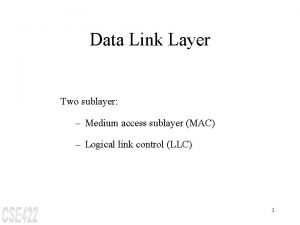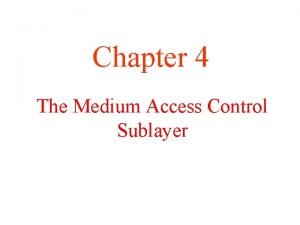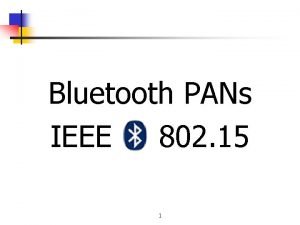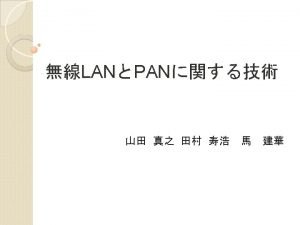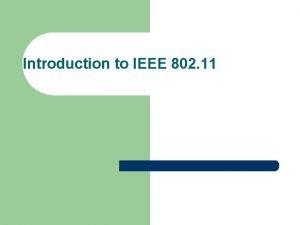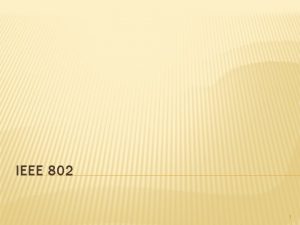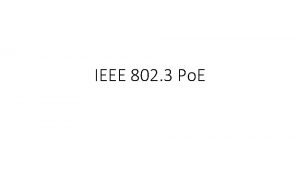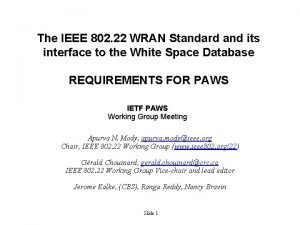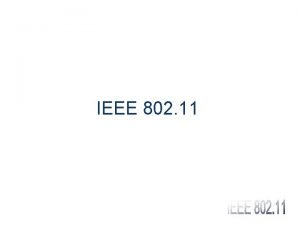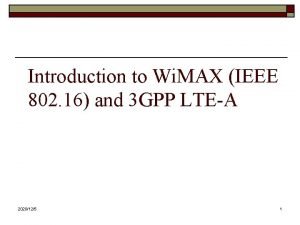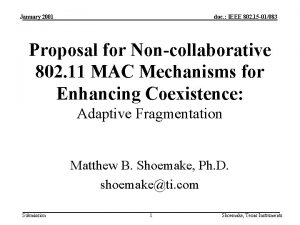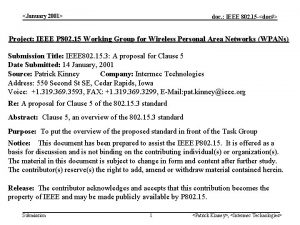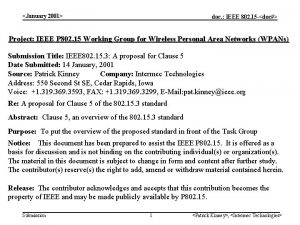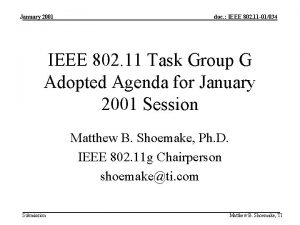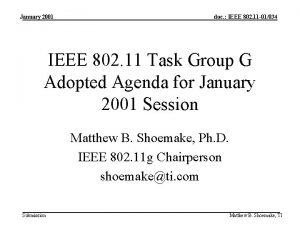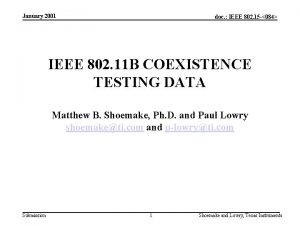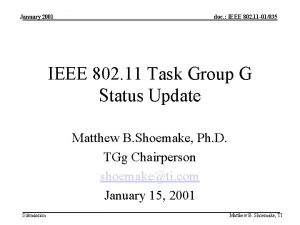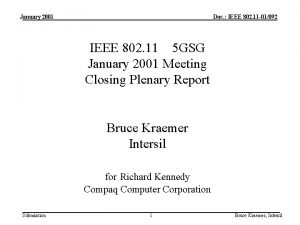January 2001 doc IEEE 802 15 01083 r










- Slides: 10

January 2001 doc. : IEEE 802. 15 -01/083 r 1 Project: IEEE P 802. 15 Working Group for Wireless Personal Area Networks (WPANs) Submission Title: 802. 15. 3 Coexistence with 802. 15. 1 (Bluetooth) Date Submitted: January 16, 2001 Source: Oren Eliezer Company: Texas Instruments Israel Address: POB 5133, Kfar-Saba 44150, Israel Phone: +972 -9 -7476962, Fax: +972 -9 -7430951, E-Mail: Oren. E@ti. com Re: PHY layer interference between 802. 15. 3 and 802. 15. 1 (Bluetooth) - (Original) Abstract: This presentation shows some preliminary results of coexistence simulations in which a Bluetooth on-channel interferer is assumed for an 802. 15. 3 receiver, and vice versa. Purpose: The purpose of this is not only to show the numerical results of the preliminary simulations, but also to make the claim that the coexistence between the two systems must be evaluated at higher levels, using performance measures that correspond to system performance (application dependent). It is also implied that since the 802. 15. 3 standard is being defined at this time, provisions could be made for the enhancement of coexistence performance within that standard. Notice: This document has been prepared to assist the IEEE P 802. 15. It is offered as a basis for discussion and is not binding on the contributing individual(s) or organization(s). The material in this document is subject to change in form and content after further study. The contributor(s) reserve(s) the right to add, amend or withdraw material contained herein. Release: The contributor acknowledges and accepts that this contribution becomes the property of IEEE and may be made publicly available by P 802. 15. Submission 1 Oren Eliezer, Texas Instruments

January 2001 doc. : IEEE 802. 15 -01/083 r 1 IEEE 802. 15 TG 2 802. 15. 3 Coexistence with 802. 15. 1 Monterey January 16, 2001 Oren Eliezer Texas Instruments Israel Oren. E@ti. com Submission 2 Oren Eliezer, Texas Instruments

January 2001 doc. : IEEE 802. 15 -01/083 r 1 Outline • Motivation • PHY simulation results for 802. 15. 3 interfering with a Bluetooth receiver • Comments on those results • PHY simulation results for Bluetooth interfering with an 802. 15. 3 receiver • Comments on those results • Summary Submission 3 Oren Eliezer, Texas Instruments

January 2001 doc. : IEEE 802. 15 -01/083 r 1 Motivation • 802. 15. 3 systems will be used for short-range high data-rate applications. • These may be a significant source of interference in terms of likelihood of presence and spectral occupancy (large bandwidth). • How will this degrade the perceived performance of 802. 15. 1 (Bluetooth) systems (both voice and data connections)? • How much will the 802. 15. 3 systems suffer from coexisting 802. 15. 1 transmissions? Submission 4 Oren Eliezer, Texas Instruments

January 2001 doc. : IEEE 802. 15 -01/083 r 1 BER vs. C/I Simulation Results (802. 15. 3 interference to a Bluetooth receiver) Submission 5 Oren Eliezer, Texas Instruments

January 2001 doc. : IEEE 802. 15 -01/083 r 1 Comparison with BT to BT Collisions • Required C/I for BER=0. 1% with Bluetooth interference is 11 d. B, whereas C/I for BER=0. 1% with 802. 15. 3 is about 5 d. B better due to wider bandwidth. • Chances of collisions are proportional to bandwidth (higher for 802. 15. 3). Submission 6 Oren Eliezer, Texas Instruments

January 2001 doc. : IEEE 802. 15 -01/083 r 1 Comments on Results for 802. 15. 1 (BT) • Simulations were for PHY only (BER), rather than PER or higher-level performance measure. • Frequency hopping was not taken into consideration (simulation is for on-channel collision) • Roll-off factor for 802. 15. 3 not decided upon yet. Will affect results for interference at frequency offset (on-channel won’t change much). Submission 7 Oren Eliezer, Texas Instruments

January 2001 doc. : IEEE 802. 15 -01/083 r 1 Bluetooth Interference to 802. 15. 3 Submission 8 Oren Eliezer, Texas Instruments

January 2001 doc. : IEEE 802. 15 -01/083 r 1 Comments on Results for 802. 15. 3 • Simulation results are for segment error rate (SER), rather than higher-level performance measure. • Frequency hopping was not taken into consideration (simulation is for on-channel collision). • 802. 15. 3 MAC and higher layer not finalized. Will affect system-level results. Submission 9 Oren Eliezer, Texas Instruments

January 2001 doc. : IEEE 802. 15 -01/083 r 1 Questions (Summary…) • What will 802. 15. 3 really be used for and when? • What realistic coexistence scenarios may be assumed? • Backwards compatibility with 802. 15. 1? (could offer potential coexistence performance enhancement). • System level simulation required! • Let’s force 802. 15. 3 to consider coexistence! Submission 10 Oren Eliezer, Texas Instruments
